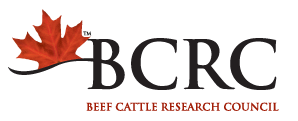
This webinar will present new tools available to producers to assist with making decisions around forage production on your operation including the Forage U-Pick tool and Carrying Capacity calculators.
Registering on your smartphone? After you click ‘I am not a robot’, scroll up until you find the task to complete.
When
Wednesday, March 25th at 7:00 pm MT
- 6:00pm in BC
- 7:00pm in AB and SK
- 8:00pm in MB
- 9:00pm in ON and QC
- 10:00pm in NS, NB and PEI
Interested but aren’t available that evening?
Register anyway! This webinar will be recorded and posted online at a later date. All registrants will receive a link to the recording and additional learning resources. By attending the live broadcast, you’ll have the opportunity to interact and ask questions too.
Duration
Approximately 1 hour.
Cost
BCRC webinars are available and free of charge thanks to guest speakers who volunteer their time and expertise to support advancements in the Canadian beef industry, and through the Technology Transfer project funded by the Canadian Beef Cattle Check-Off and Canada’s Beef Science Cluster.
Speakers: Tara Mulhern Davidson, Extension Writer, Beef Cattle Research Council
Tara Mulhern Davidson works with the Beef Cattle Research Council as an extension writer and has experience managing beef, forage, and communications projects for many organizations. Tara spent years working in prairie conservation and range and riparian management, and enjoys exploring ecosystem management from a ranching perspective. She ranches with her family near Ponteix, Saskatchewan.
Tamara Carter, Saskatchewan Forage Council
Tamara Carter, her husband Russ and their three children run a mixed farming operation along the South Saskatchewan River near Lacadena, Saskatchewan. They crop 6, 000 acres and run 200 head of commercial Black Angus cattle on 7, 000 acres of native prairie grasslands. Her interest in forages and research led her to the Saskatchewan Forage Council, which she is currently chairing for a third term. She also sits on the Strategic Advisory Board of the recently constructed Livestock and Forage Centre of Excellence, in Clavet, SK.
Julie MacKenzie, Saskatchewan Forage Council
Julie MacKenzie is a Professional Agrologist and an active mixed farmer who grew up near Saskatoon, but now farms and consults in the Hazenmore, SK area.
Over the past 18 years, Julie has been active in extension focusing on forages and rangeland agrology, beneficial management practice programming, invasive weed management, source water protection and integrated water management.
Her work with the Sask Forage Council has been on-going for nearly two decades. Julie developed the first Forage Species Adaptation Tool the Council put out in 2007. She was excited to bring her knowledge of the previous Saskatchewan tool forward for the creation of Forage U-Pick for Western Canada.
What is a webinar?
Webinars are just like attending a workshop or conference, but from the comfort of your own home or office. We bring the presentation right to you. They’re easy to join and participate in. A reliable, high-speed internet connection is required.
All you need to do is register beforehand, and about 5-10 minutes before the webinar is scheduled to begin, click the link you were provided when you registered. Then turn up your computer speakers or call the phone number provided. That’s it! Sit back and enjoy.
As a participant, you can anonymously answer polls and surveys, and will have the opportunity to ask questions near the end of the webinar.
You can find more beef research-related webinars hosted by other organizations on our events calendar.
Don’t have high-speed internet? Consider calling a neighbor that does and watch the webinar together, or call your regional ag office to ask whether arranging a group viewing is possible.
Visit our Webinars page to find other upcoming BCRC webinars and the recordings of our past sessions.
Click here to subscribe to the BCRC Blog and receive email notifications when new content is posted.
The sharing or reprinting of BCRC Blog articles is welcome and encouraged. Please provide acknowledgement to the Beef Cattle Research Council, list the website address, www.BeefResearch.ca, and let us know you chose to share the article by emailing us at info@beefresearch.ca.
We welcome your questions, comments and suggestions. Contact us directly or generate public discussion by posting your thoughts below.








